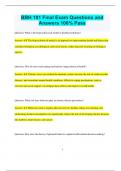BBH 101 Final Exam Questions and
Answers 100% Pass
Question: What is the biopsychosocial model in health psychology?
Answer: ✔✔ The biopsychosocial model is an approach to understanding health and illness that
considers biological, psychological, and social factors, rather than just focusing on biological
aspects.
Question: How do stress and coping mechanisms impact physical health?
Answer: ✔✔ Chronic stress can weaken the immune system, increase the risk of cardiovascular
diseases, and exacerbate mental health conditions. Effective coping mechanisms, such as
exercise and social support, can mitigate these effects and improve overall health.
Question: What role does behavior play in chronic disease prevention?
Answer: ✔✔ Behaviors such as regular physical activity, healthy eating, not smoking, and
moderating alcohol consumption can significantly reduce the risk of developing chronic diseases
like diabetes, heart disease, and cancer.
Question: How does the theory of planned behavior explain health-related decision-making?
1
,Answer: ✔✔ The theory of planned behavior suggests that an individual's intention to engage in
a behavior is influenced by their attitude toward the behavior, subjective norms, and perceived
behavioral control.
Question: What is the impact of social support on mental health?
Answer: ✔✔ Social support can buffer against the effects of stress, improve coping strategies,
and contribute to better mental health outcomes, including reduced rates of depression and
anxiety.
Question: What are the primary differences between problem-focused and emotion-focused
coping strategies?
Answer: ✔✔ Problem-focused coping involves tackling the source of stress directly to reduce or
eliminate it, while emotion-focused coping involves managing the emotional response to stress
rather than changing the stressor itself.
Question: How does sleep influence overall health and well-being?
Answer: ✔✔ Adequate sleep is essential for cognitive function, emotional regulation, and
physical health. Chronic sleep deprivation is linked to increased risks of obesity, heart disease,
diabetes, and mental health disorders.
2
,Question: What factors contribute to health disparities in different populations?
Answer: ✔✔ Health disparities can be influenced by socioeconomic status, race, ethnicity,
gender, access to healthcare, education, and environmental factors, leading to unequal health
outcomes among different groups.
Question: How does exercise benefit mental health?
Answer: ✔✔ Regular exercise can reduce symptoms of depression and anxiety, improve mood,
boost self-esteem, and enhance cognitive function through the release of endorphins and other
neurochemicals.
Question: What is the role of health promotion in disease prevention?
Answer: ✔✔ Health promotion involves educating and empowering individuals and
communities to make healthy choices and implement behaviors that prevent disease and improve
quality of life, such as smoking cessation programs and nutritional education.
Biomedical model ✔✔illness always has a biological cause
Problems with the Biomedical Model ✔✔behavior
culture
3
, community
age, race, gender
genetics
Biobehavioral Model ✔✔recognizes biological, psychological, sociocultural forces in
determining an individuals health and vulnerability to disease
Hypothese ✔✔a proposed explanation made on the basis of limited evidence as a starting point
of investigation
Theory ✔✔tested answer, has a lot of information and research to almost prove it to be true, but
it is not absolute
P value ✔✔tells us what the probability is of obtaining our result if there is NO relationship
between the variables we are interested in
p value < 0.05; 5% ✔✔p value that is considered significant
There is a 3% chance that the observed results are due from random chance ✔✔p value of 0.03
4




